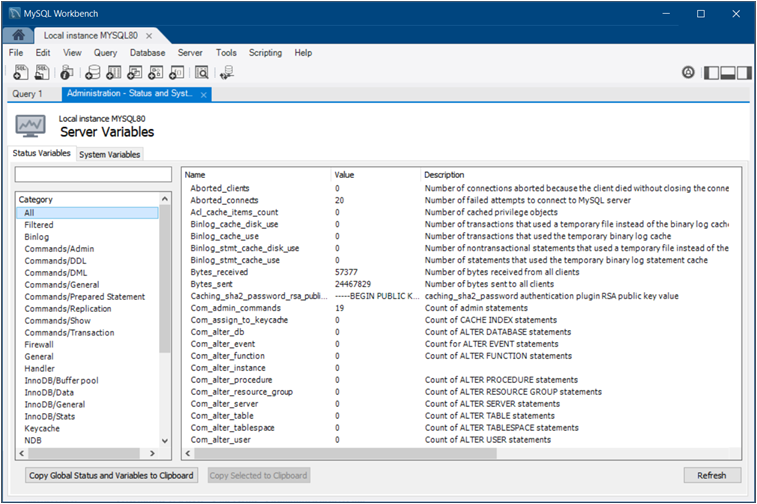Mysql Workbench Navigator

MySQL Workbench integrates database administration tools into a simple to use graphical user interface. The visual console enables DBAs to easily perform operations such as configuring servers, administering users, export and import, and viewing logs.
Backup & Recovery
View Screenshot:
Windows, Linux, OS X
From the home screen, click the new MySQL connection to open the SQL editor for this connection. The SQL editor is the default page. Click Server Status from the Navigator area of the sidebar to display the current status of the connected MySQL server instance (see the figure that follows). Once you’ve created a connection to a database on the main Home screen in MySQL Workbench, and then connected to that database, you should see the Navigator panel on the left-hand side. There should be a Data Import/Restore button a bit further down that you can click on.
Server Configuration
View Screenshot:
Windows, Linux, OS X
Start/Stop Server
View Screenshot:
Windows, Linux, OS X
Backup/Recovery
Easily create and manage online MySQL backups using the Workbench GUI for MySQL Enterprise Backup. Simple to setup, run, schedule, and view backups while in progress, this tool helps to quickly put proper backups in place. When its time to restore, the GUIs assesses the history - what, when, and where - and steps a DBAs through the recovery process.
Auditing
Easily enable MySQL Enterprise Audit and see who did what, when, where and how. Using built in filters and text search, DBAs can easily find suspect activity in your audit trails. MySQL Workbench provides a powerful grid view and enables DBAs to quickly page through data and sort across nine attributes such as user, ip, activity type, date and time.
User Administration
Administering users, granting privileges and viewing privilege information has never been easier. Using MySQL Workbench DBAs can visually add users, assign passwords and setup user profiles. Assigning and revoking global and database privileges is as easy as adding and removing privilege items from an available list.
Server Configuration
3d box drawing software. Free slot games for pc. MySQL Workbench allows DBAs to easily view and edit general and advanced parameters to quickly fine tune MySQL servers.
Server Connections
Improve server management with a comprehensive view of all server connections and visual tree based navigation provides detailed information about server and status variables, including number of threads, bytes sent and received by clients, buffer allocations size, and more.
NEW! SSL Certificate Wizard
Adobe prelude cc 2019 v8 1 for mac free download. The SSL Certificate Wizard helps create proper SSL certificates for both MySQL clients and MySQL servers. Connections in MySQL Workbench are updated with the certificates by the wizard.
Server Logs
View all the MySQL log files including error logs, binary logs, and InnoDB logs from a single, centralized administration environment to diagnose server problems quicker and track database changes. Slot machine tips 2017.
Export/Import
MySQL Workbench includes visual tools for mysqldump. Easily export/import data by selecting the database schemas and/or tables from the Object Browser. Advanced configurations are available for concurrency controls, backup type, and output formatting. Desktop next 3 2 2 – wallpaper database builder.
NEW! Table Data Import/Export Wizard for JSON and CSV
The Table Data Import/Export Wizard supports import and export of JSON and CSV files allowing for easy interoperability with MySQL tables. The new Table Data Import/Export Wizard also provides flexible configuration options including separators, column selection, encoding selection, and more.
Service Control
Mysql Workbench Navigator Review
Start and stop MySQL servers and view corresponding log messages.
System Status
Get an immediate view into the basic health indicators and counters within a MySQL environment. Easily see key values such as available features, primary server directories, replication state, and security settings for authentication and ssl. Simple reports and graphs enable DBAs to easily track memory usage, connections, hit rates, and more.
Additional Resources
The Options File editor is used to view and edit the MySQL configuration file (my.ini on Windows or my.cnf on Linux and macOS) by selecting check boxes and other GUI controls, and then making edits. MySQL Workbench divides the options file into its own groupings as a set of tabs (such as General, Logging, InnoDB, and so on). Make an edit and click to commit the changes.
Mysql Workbench Navigator -

You can open the Administration - Options File secondary tab from either the Navigator area of the sidebar panel or by clicking Server and then Options File from the menu.
The options file editor includes the following components:
Option file groupings, as divided into convenient tabs by MySQL Workbench.
A Locate option search field to search your MySQL options configuration file.
Configuration File path, so you know the configuration file you are editing.
An options file group selector, to select the option [group] to edit. Because the same option can be defined under multiple groupings, it is important to choose the correct group when making edits. [mysqld] (the MySQL server) is the default and most common group. For additional information about groups, see Using Option Files.
The following figure shows an instance of the Options File with the General tab selected.

Figure 6.5 Navigator Administration: Instance: Options File: General Yojimbo 4 0 4 download free.
Workbench Mysql Download

Mysql Workbench Navigator
UNDER MAINTENANCE